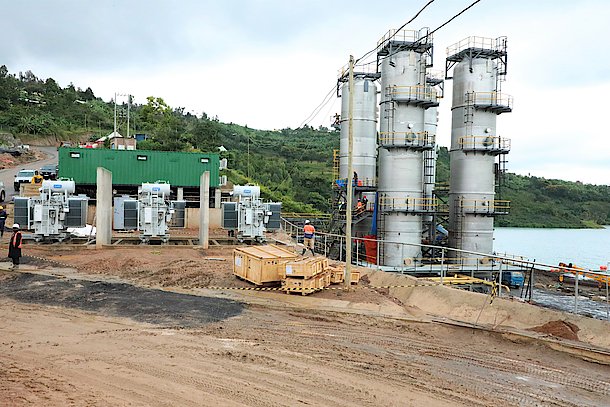REMA assures Safety Amidst Fears of Methane Gas Explosion in Lake Kivu
The Rwanda Environment Management Authority (REMA) has dispelled concerns over the possibility of methane gas in Lake Kivu exploding and endangering nearby residents.
Some locals living around Lake Kivu have expressed fears that volcanic activity from nearby mountains, like Nyiragongo, could interact with the methane gas in the lake, causing a deadly explosion. Berchimas Kamali, a resident of Gisenyi for 47 years, shared his concerns, saying, “We’ve always heard that there are lava tunnels connecting the volcanoes to the lake, and there’s talk of methane gas erupting and killing two million people living around the lake.”
Similarly, Epimac Kandiko from Rutsiro district mentioned, “I heard an expert say it could explode, just like another lake in Cameroon that had a gas explosion killing many people. As residents near Lake Kivu, we also have these fears.”
REMA, however, assures the public that there is no need for such concerns. The Rwandan government has already initiated methane gas extraction from Lake Kivu, not only to prevent such accidents but also to generate electricity.
Mugisha Ange, a REMA chemical specialist, confirmed that the methane gas extraction is underway, thus minimizing any potential danger. He said, “We focus on three key things when monitoring the lake, the first being the safety of the communities living around it. Since methane gas extraction began in 2008, the lake has remained as stable as before.”
He added that the gas extraction was essential not only for energy production but also to prevent any gas build-up that could pose a threat, similar to other lakes with methane reserves that have caused fatalities. Mugisha further clarified that volcanic eruptions, such as Nyiragongo’s eruption in 2002, did not affect the lake, despite releasing 13 tons of lava.
Currently, Kivu Watt is generating 26 megawatts of electricity from methane gas, with plans to produce an additional 56 megawatts through a contract with Simbion Power. The government also signed an agreement with GasMeth, a company set to process methane for cooking purposes.
So far, only 5/1000 of the methane gas reserves in Lake Kivu have been extracted. REMA acknowledges ongoing challenges in protecting the lake, particularly as it is shared between Rwanda and the Democratic Republic of Congo. Rwanda has implemented agreed-upon regulations, but sometimes the neighboring country falls short, which affects both sides.
Another challenge is the limited awareness among local communities about environmental protection. Many continue to dispose of waste in the lake, harming the ecosystem, including fish and other aquatic life.
In Rwanda, Lake Kivu touches the districts of Rubavu, Rutsiro, Karongi, Nyamasheke, and Rusizi.

